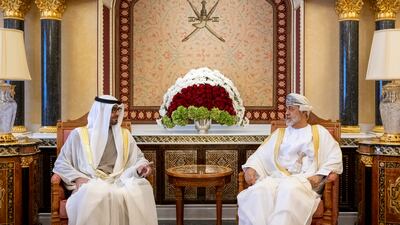As well as sharing long borders, the UAE and Oman share deep historical and cultural ties. This was on show during President Sheikh Mohamed bin Zayed's state visit to the country, which began on Tuesday.
The gifts the two sides exchanged reflect these bonds. Sultan Haitham presented Sheikh Mohamed with a traditional Omani sword. He also awarded him the Order of Al Said Medal, normally bestowed on senior international representatives in appreciation for their exceptional role strengthening relations with Oman. For his part, Sheikh Mohamed awarded Sultan Haitham the Order of Zayed.
After official meetings, Sheikh Mohamed tweeted: "Thank you to my brother the Sultan of Oman for the warm welcome. Our two nations are united by deep bonds of history, friendship and common interest, and I look forward to working together to continue forging a brighter future for our people."
The trip encompassed more than a symbolic renewing of ties. In a move that profoundly changes the regional economy, it was also announced that both countries are to be linked by a rail system, for both freight and passengers. The passenger trains can reach speeds of 200 kilometres an hour, and will connect Abu Dhabi to the north of Muscat, Oman's capital. A new joint company to oversee the project will be formed by Etihad Rail and Oman rail.
This is only one of 16 agreements to have been signed by the two countries during the visit, which encompass fields such as energy, transport and industry, and on Wednesday, Abu Dhabi's ADQ, one of the region's biggest holding companies, said it had identified Dh30 billion in investment opportunities in Oman. Recently, the ADQ also signed a Dh10bn partnership agreement with the Oman Investment Authority.
It is a big moment for the bilateral ties between the nations. But it fits into a wider pattern of diplomatic and economic co-operation that has been taking place across the GCC region. A shared culture and destiny have always tied the bloc's member states together, but co-operation has been particularly strong recently.
In January of 2021, the Al Ula Declaration became a particularly important moment for regional unity. It effectively restored diplomatic ties between Qatar and four Arab nations, three of them from the GCC. This was diplomatically important. But, for a region whose people share such close bonds across borders, it was deeply personal, too.
The future is full of events for the GCC to co-ordinate on. The World Cup in Qatar will boost the domestic economy as well as that of its neighbours. On Wednesday The National reported industry experts saying that the event will boost the Dubai property market, providing a ‘mini-Expo like effect'.
Countries outside the region often look to the bloc for stability, in addition to working with individual member states. During the UN General Assembly meetings last week, the GCC grouping met collectively with representatives from the UK, US, China and France. Moreover, the UK is in talks for a major trade deal with the GCC. There are hopes one might be struck by August 2023. Similar conversations are happening with other major powers.
Beyond economics, the region is also integrating itself into the fight against the climate crisis. Cop28, arguably the most important international climate conference around, will take place in the UAE next year. A number of its states have committed to ambitious net-zero pledges. There are regular meetings among ministers of health, interior and other portfolios to ensure co-operation.
Oman and the UAE are stronger for this recent reminder of a shared history. But every time the GCC's member states share similar moments, and there are many such occasions, the bloc as a whole benefits.


